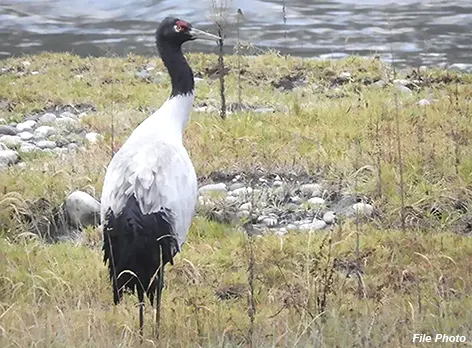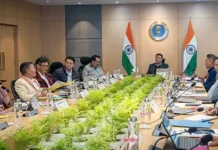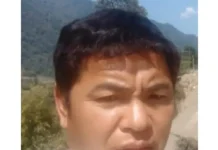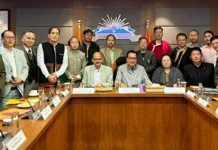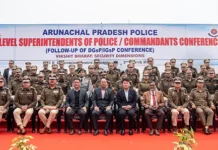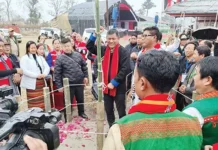[ Ahmed Omar Haroon & Yachang Kani ]
I am a black-necked crane – a bird revered as sacred by the people of Bhutan and the Monpa tribe of Arunachal Pradesh. Every year, we travel from our native place Bhutan to the valleys of Arunachal. Sangti, Chug and Zemithang are our favourite wintering grounds, where we spend a few months in the paddy fields and marshlands. We used to travel in large numbers, but in recent years, fewer of us are willing to visit Arunachal, I’m not entirely sure why.
Each time I come back, I notice several changes – new homestays, expanding roads, and rivers that no longer flow as they once did. The paddy fields we depend on for food are shrinking, leaving us with little space to forage. We like to eat grains, insects, and tubers and we have many varieties of food preferences, but paddy fields remain our favourite feeding ground. With less space to forage, we face a greater threat – dogs. They chase us relentlessly, forcing us to stay constantly alert, making it difficult to feed in peace. Unlike smaller birds, we cannot take flight instantly. Much like a plane, we need a runway to gather speed before lifting off.
This year, after visiting Sangti, we decided to stop at Chug valley before heading back to Bhutan. That’s when disaster struck. While feeding, I failed to notice two dogs approaching. They lunged at me. In a desperate attempt to escape, I managed to take flight, but not before suffering a deep wound. The pain was unbearable, and I couldn’t fly far. Fear gripped me – if the dogs came again attacking, I wouldn’t have survived another attack.
Helpless, I wished for a birder to come, hoping they would notice my injury and help me. My prayers were answered as four birders arrived, cameras in hand. The next morning, they returned with forest officials and a veterinary team. Though I was in pain, I felt a glimmer of hope as they gently captured me and placed me in their vehicle – my first ride in a human’s car. They stitched my wound, kept me under observation, and even fed me my favourite foods – grains, tadpoles and potato rolls.
But my heart ached for my mate. As they took me away, she circled above, calling out in distress. I knew she wouldn’t sleep peacefully without me. The thought of being taken to a rehabilitation centre for weeks worried me. But the kind doctor understood my pain – not just physical, but emotional. He decided to keep me in a protected enclosure right in Chug valley, where my better half could see me every day. Though we couldn’t fly together, we could still call to each other, reassuring one another that we were safe.
For two weeks, I healed under the care of a veterinary team and the residents of Chug. People visited, praying for my speedy recovery. Slowly, my feathers regrew, my wound closed… and finally, the day came – I was free! As I stepped out of the enclosure, my mate rushed to my side, tears of joy sliding down her face.
Though our return to Bhutan was delayed, we left with hearts full of gratitude. The caring and loving people of Arunachal saved my life, and I will never forget their kindness. I hope they continue to protect every voiceless creature that shares this land. And I hope they find a way to address the growing threat of dog attacks, so that more of my kind feel safe enough to return. (Haroon is researcher at the Wildlife Institute of India, Dirang, and Kani is RFO, Sinchung.)

